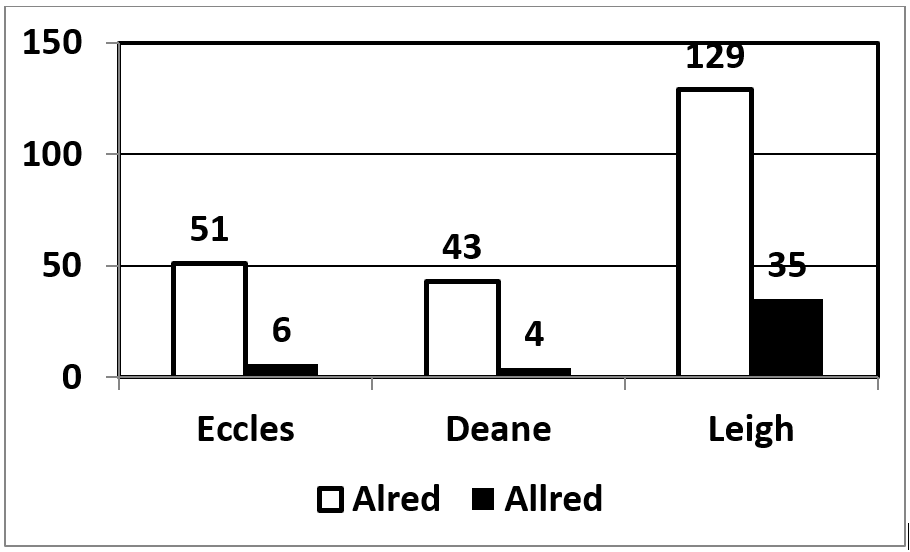Examples of how our ancestor
John Allred's (c1635-1701)
name was spelled



A History of the Allred Family Name
By: John B. Allred
Dublin, Ohio
We most likely got our family name in the early 1500s and our own ancestors gave it to us.
The earliest written record of our family name that I know of was reported by Keith Allred[1] who found a reference to the Allred name on a tax roll in Eccles Parish, Lancashire, in the year 1526. The next earliest mention of our family name was an account of a riot which occurred in 1535 in neighboring Leigh Parish[2]. However, those who recorded these events missed on the spelling of the family name, at least with respect to what we think today. In the case of the tax roll, the name was John Alrede. As to the participants of the riot, the names were listed as John Alerd, the younger, William Alerd, and Egod Alerd.
How did we get our family name? No one gave it to us. Not the King, not the Church nor anyone else. That is not how it worked. Rather one or more of our ancient ancestors selected that name. Why did we get a family name? Blame that on the King and his demand for taxes. After William the Conqueror of Normandy became King of England by conquest, he ordered a census in the year 1085 to find out just what he had conquered. He asked: "How many hundreds of hides were in the shire, what land the king himself had, and what stock upon the land; or, what dues he ought to have by the year from the shire."
In short, the King wanted to know the identity of everyone who could be assessed taxes. The record of the census was called the “Doomsday Book” because everyone had to be included and there was no appeal as to what it said about people and their wealth.
But that census revealed a problem – there was no systematic way to identify individuals. At the time, people were identified by their first name and home village. If there were two men with the same name in a particular village, they would be distinguished by age with the addition of “the Elder” or “the Younger” to their name, even if they were not father and son. Thus, it was not uncommon to see early documents identify a person as “William, the Younger, of Pendleton”. The crown imposed an edict that all should have a surname, also called a family name.
Family names were, at first, required of people with enough wealth to pay taxes. This did not include our ancestors - they were poor peasants! We were late to the party but we eventually got there because of the Church. After King Henry VIII took over the Church in 1534, his secretary of state, Thomas Cromwell, ordered all churches to record births, marriages and baptisms beginning in 1538. This meant that all church members, i.e. everybody, had to have a name because everyone was required to go to church. The effort at recording the personal information of everyone was not organized well. Record keeping really began with the accession of Elizabeth I on November 17, 1558 and the Act of Parliament of April, 1559 when the establishment of the Church of England was completed.
We are fortunate to have a CD of English Parish records[3], from which I extracted every mention of the Alred/Allred name. The CD includes the county of Lancaster (Lancashire) and the Alred/Allred names are listed in the Church records of three parishes: Eccles, Deane, and Leigh.
It is well established that Solomon was the first Allred who came to the Colonies that eventually became the United States. His father and mother, John Allred and Ellen Pemberton, were both born in Eccles Parish, Lancashire. In fact, Ellen Pemberton’s grandfather was the Eccles Parish Clerk, Thomas Smith. John Allred was born in the small village of Pendleton as was his father, William Allred, and his grandfather, John Allred (b. 1571, d. 1632). With this family history, it was easy for me to assume that our Allred family was clustered around Saint Mary The Virgin, Church, home church of Eccles Parish, Lancashire. And at first glance of the records, this view seems to be confirmed because in the 1500s, there were only 23 entries of our family name in Lancashire and all of those were in Eccles Parish. All of these family entries were spelled Alred (one “L”), none with two “Ls”. But when the records from the 1600s are included, it is obvious how wrong I was!
While all of our direct line ancestors resided in Eccles Parish, there were a lot more Allreds in two other Parishes in Lancashire, Deane and Leigh. The chart shows that only 21% of the Alred/Allred family lived in Eccles Parish from 1600 to 1700 while 61% lived in Leigh Parish. What’s more, the chart also shows that an overwhelming number, about 84%, of our family was listed as Alred (one “L”) while only about 16% was spelled Allred (two “Ls”).

